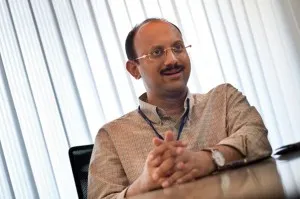Madan Padaki on ‘Building a global Venture Out Of India’
At TechSparks 2013, Madan Padaki spoke about ‘Building a global Venture Out Of India’. Padaki, co-founded skills assessment company, MeritTrac Services and sold it to Manipal Education. Currently he is co-founder and chairman at rural social enterprise Head Held High Services (HHH). Padaki spoke about his startup journey and how ventures could build a global company out of India.

It all started in 2000, when he attended TiE (The Indus Entrepreneurs) conference, and he got this mad idea (his words) of starting a company that was into skills assessment. Padaki and his co-founder were not very familiar with with human resources but decided to startup anyway. “We were thrown out all the VC firms that we went to but that did not deter us,” said Padaki.They finally found an agriculturist who pumped in Rs 1 crore, but he lost as the money he invested. “Post 9/11, we were 15 days from shutdown, then we slowly started to do well in 2003, but by 2004, we were almost running out of cash. That’s when Helion rescued us with some equity infusion and we also raised money from HSBC. And in 2005 we sold the company to Manipal Education,” adds Padaki.
Mistakes:
While MeritTrac did well in India, it did not do well globally. “Unlike MeritTrac, Manipal Education gets 50 per cent of revenues come from outside India,” points out Padaki. The problem is simple. MeritTrac never looked at designing the product to go global but did not have the architecture to go global. So after building the Indian business they were ready to scale globally, but when we were unable to do so, because it was too late to change the product mid-way.
Padaki advised that at the very outset, the business model, has to be global- and noy just when they are ready to pursue an opportunity.
Redemption:
With his latest startup, Padaki has made sure that the HHH platform can be deployed globally. He spoke a bit about one of HHH’s initiatives. “We took Ramesh, a zero educated villager, his entire family earned Rs 3000 per month. He was put through a gruelling 16 hour for 7 months, where he was taught english, math and soft skills like confidence. We turned him into somebody who even his mother could not recognize,” remarked Padaki. Ramesh now works in a village BPO run by HHH and earns Rs 15,000 a month now. Padaki refers to individuals like Ramesh as Rubans or rural urbans (more a mindset) and the efforts to boost livelihoods in villages as Rubanomics (Ruban + economics).
HHH now plans on deploying the same model globally across geographies like Brazil, Colombia and Africa. They are already in talks with representatives in Brazil and Colombia and working on customizing the model for them.
Other strategies to go global:
The other ways to globalize and understand how going global can help is through global startup programs. He pointed out to the immense experience and learning, which Guruji- a teaching and gamification platform- garnered after being selected for the Unreasonable at Sea program power of what is possible. Padaki also pointed out to Silicon Valley incubator programs like 500 startups.
Padaki also thought of a clever way to get global representation for his company by choosing angel investor across the world. One of their angels Kartik, has opened doors with the government in Colombia. “We don’t have a sales team in Colombia but we have an angel investor, who’s doing the sales for us,” iterates Padaki.
HHH is also striving to make the concept of Rubanomics as a subject for study in business schools and has already created a Centre of Rubanomics at SP Jain Institute of Management and Research in Mumbai and are also in talks to sign on with a school in Brazil.
Summing up, Padaki said that the technology platform has to be global, scalable ( they are building a ruban app store) right from the early stages of development. The globalization model needs to fit into the overall strategy for the company. He ended with saying that every enterprise needs to be global otherwise its self-limiting.







